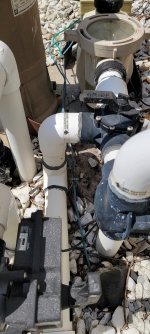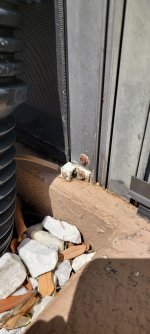 my pump motor has been replaced for the third time in 5 years. I moved to Orlando on 2017, and this is my first pool. We replaced the pump, but have had corrosion issues on the motor. I have searched this forum and other places for answers as to what would cause this, and I keep coming back to the bonding wire. I bought new 8 guage bare copper wire and asked him to redo the bonding, but he said that's not the problem. I told him the corrosion occurs within 3 months of the motor being replaced. He says that's unusual but it's indicative of a seal leak within the pump. So, even though I had new wire, he said it doesn't need it. I've included pics of all of the bonding and what's strange to me is that it looks like it's grounded to the house and the junction box.
my pump motor has been replaced for the third time in 5 years. I moved to Orlando on 2017, and this is my first pool. We replaced the pump, but have had corrosion issues on the motor. I have searched this forum and other places for answers as to what would cause this, and I keep coming back to the bonding wire. I bought new 8 guage bare copper wire and asked him to redo the bonding, but he said that's not the problem. I told him the corrosion occurs within 3 months of the motor being replaced. He says that's unusual but it's indicative of a seal leak within the pump. So, even though I had new wire, he said it doesn't need it. I've included pics of all of the bonding and what's strange to me is that it looks like it's grounded to the house and the junction box.  this is the pool heater
this is the pool heater this is on the side of the house
this is on the side of the house the blue wire snakes to the left and up the conduit (it has house paint on it), while the green wirw goes along the side of the house and is in the previous pic
the blue wire snakes to the left and up the conduit (it has house paint on it), while the green wirw goes along the side of the house and is in the previous pic this blue wire goes to the pool cage
this blue wire goes to the pool cage 
What am I missing?
Last edited:









